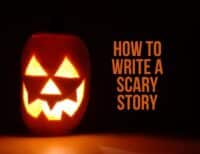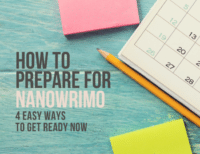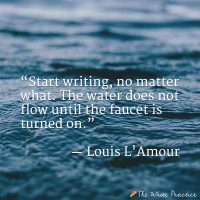Write every day. Set a word count and don’t get up until you reach it. Butt in chair, hands on keyboard.
Writers get a lot of advice about the importance of pushing ourselves to get the words on the page. It’s a principle I try to live by, and I know I’m not alone. But there are times when the best thing you can do for your writing is to… stop writing.
Stop Writing?
The creative process is one of cycles. There are times to push hard and there are times to step back. How do you know which are which? Here are three times the best thing you can do is to stop writing.
1. When you finish a draft.
That’s one big brain dump you just pulled. It’s easy to get caught up in your own perceptions of your work. So before you start editing, take a break. Or at very least, work on something else for a while. You’ll come back with a refreshed mind, letting you hone your draft into the best work possible.
Besides, you deserve a chance to celebrate your accomplishment!
2. When you get stuck, and forcing it doesn’t work.
Generally I’m a butt-in-chair type of girl—I believe in the power of persistence to get around most writer's block issues. However, sometimes, determination just isn’t enough.
When this happens, step away and try to do something relaxing. Take a walk, do a puzzle—anything that will quiet your mind and let your subconscious take a stab at it. There’s a good reason for the mid-shower eureka moment stereotype—even when you stop focusing on a problem, your mind is still working on it. Relaxing lets your subconscious try things your conscious brain can’t.
3. After reviewing feedback from a critique.
Our stories are our precious brain-babies. Even when we ask for feedback, our gut reaction to new ideas can be, well, defensive. But before you toss suggestions out the window, take some time away from your manuscript to mull them over. You may end up surprising yourself with the insights you gain by giving new ideas a chance.
Most of the time, it’s in your best interest to stick to a consistent writing routine. But there are times to take a break and let your work breathe. A little mental space never hurt anyone… in fact, it can be just the thing.
By knowing when to push harder and when to step back, you can take advantage of the ebb and flow of the creative process and make your work its very best.
When do you take breaks from your writing routine?
PRACTICE
Spend fifteen minutes not writing. Instead, take a walk, close your eyes and meditate, read a book. Do something a bit boring, if you can, something that makes you want to turn back to your writing, but resist the urge. If you get any ideas for your work in progress, jot them down and then go back to not writing.
How does it feel? Refreshing? Share in the comments.








Thanks for this post, Emily! 🙂
I definitely agree with you. Letting go of cherished writing for a time is sometimes the key. I take a break from my writing projects every Sabbath (Saturday). Even though it’s hard to distance myself from my writing sometimes, I find that taking a break actually makes me more productive. By the end of the day I am raring to write again. 🙂 Consequently, the weekend is often my most inspiring time for writing. I guess I can think clearer without all the business of the week cluttering my mind.
Sounds like you have a smart system, Joy–there’s not much out there worse for your creative process than burnout! Thanks for sharing!
I spent 15 minutes playing a video game, which for me is actually pretty challenging. Sitting outside contemplating existence is often much easier. lol
Great suggestions! So much advice is all about writing no matter what and often that’s good, but every now and then a break is needed.
-Dana
This is exactly what I do for many of my lengthier writing projects. Sometimes you have to give yourself time to rest and refresh before sitting back down to write and edit. You’ll soon see words and phrases that can be removed, and many other elements in your work that can be reworked.
Best advice ever on when NOT to write!
I blew through NaNoWriMo in 2012 despite two car accidents and an unrelated week in the hospital. I’ve been writing on that WIP since, along with two other projects. I’m close to finished with my first draft of it; I have beginning, and end, and LOTS of middle, but I’ve had some problems connecting those dots. I’ve been stuck for a quite while and wasn’t able to figure out why.
I tried rereading it, I tried analyzing and outlining it (I’m a pantser, so of course it’s kinda rough). I have sort of figured out that the problem is in the structure (’cause hey, pantser!) and have been going through some of my writing books to see if I can get to the root of it.
I finally stopped forcing myself to sit down and go over it yet again, and started reading. Other people’s books. (J D Robb ROCKS!) About a week ago I sat down and looked the darn thing over one more time, and I think I finally have an idea where to start. But it took STOPPING writing to do it.
I belong to a writer’s group at my public library, and two months ago read my prologue and first chapter to the group. Got some good criticism, too. That gave me some thoughts on what to do and where to go as well, so I’m trying to add that in while I’m doing my first revision (I figure no point trying to connect the dots when some of the dots are going away).
Anyway, I sort of hit all three of your reasons on this one. And boy, was that ever a good idea!. Now, if I can only get life to stop poking it’s stupid possum nose in my face so I can get back to it! I know, I know – you have to MAKE time. Your blog doesn’t time stamp except for X Hours Ago stuff, so let me just say that the only time I can actually get uninterrupted time to write is when everyone else in the darn world is dead asleep, like now – 4:33 AM.
I do have a question, though: how can I find someone to read my stuff and give me feedback? What do you call them, beta readers? My writer’s group only meets once a month, and there’s enough of us that the next time I’ll have a chance to submit will be a year from now. Plus, I do SciFi and Steampunk, and the others are mostly mystery and romance. So they may be willing, but are unfamiliar with my genres. Any suggestions?
Try the NaNoWriMo forums there may be one for beta readers
I love reading this blog. I have a very busy life, but I always try to improve my English skills by trying some of the activities I see here. Since English as not my first language, I feel like trying different techniques is the best way of improving it. Thank you for your post.
Hi Emily,
Great post. I always hit a lull after finishing a draft or a final version of a blog post or article.
I recommend writers stop writing and spend time:
1) Meditating – even 15 minutes a day can help
2) Exercising – I love running
3) Pursuing another hobby – music, blogging, cooking etc.
Writing involves sitting in on place and focusing on a thought at length, like meditation. Like exercise it’s hard work and requires discipline.
And you also need ideas for your writing projects; a hobby can provide you with valuable insight that you can use for your writing projects.
I look forward to your next post.
I enjoyed reading this post. It is refreshing to not think about meeting deadlines and word counts. Sometimes, I don’t bother counting words, especially when I’m writing in my journal. And it’s hard to not want to write when you feel stressed. It’s cathartic.
I recently finished a draft of a short story I’ve been working on for months. There are times I wanted to give up in it because I got so frustrated with finding ways to make a published work better. I stuck it out. And I feel better for doing so. I wanted to write the third draft out on a keyboard right away, but took some time to let it simmer. It turned out to be the best thing I could do to give the story my full attention. I’m currently working on the edits.
Hi I completely agree with #2. Nothing worse than trying to force creativity. I always tell myself “I will write again,” and close the computer.
I agree. Force is something that can’t deliver something creative.